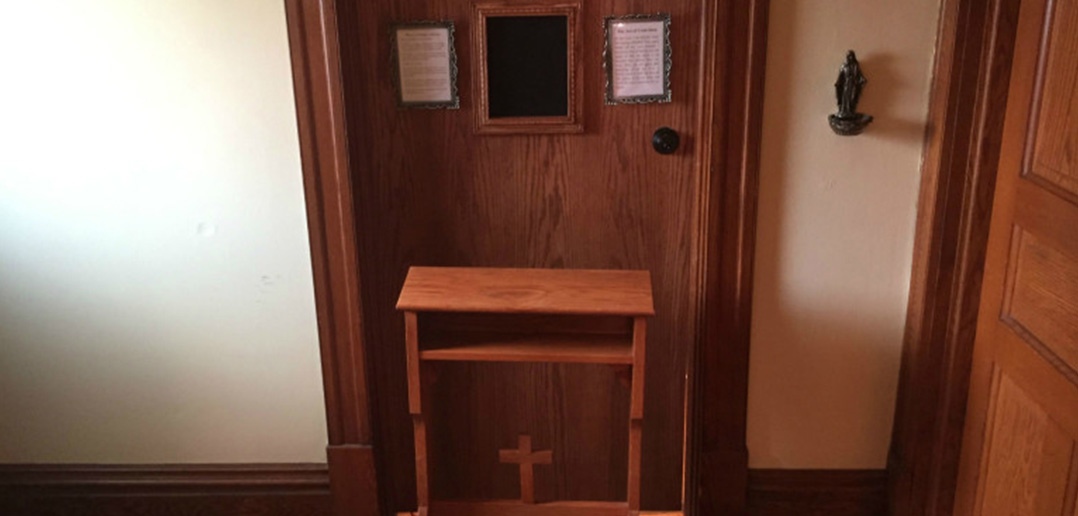
Here is an idea I’d like to propose to my brother priests. Make the Sacrament of Confession as accessible as possible. For me, I knew it was difficult (if not impossible), to sit over in Church in the Confessional all day. Parish life is quite a bit more demanding than the days of St. John Vianney. So, I asked myself, what could I do to make the “St. John Vianney thing” happen, while still attending to many of my parish responsibilities? Then it occurred to me … if you can’t bring the priest to the Confessional, bring the Confessional to the priest.
I still keep my regular Confession times in Church. And, like most priests, I still let folks know, through the parish bulletin, that they can call for an appointment at any time. But, I also knew that folks either feel squeamish “imposing” themselves on busy priests (so few would rarely, if ever, call), or they are not comfortable with face-to-face Confessions. This is when I looked at my rectory layout, and saw that I could make a Confessional right smack dab in the entryway of my rectory.
I began by setting up a separate intercom for Confessions and, as you can see by the picture, I simply call them in, they kneel at my office door (I put a screen in my office door), and they are going to Confession!! Also, I posted, on the door, the “Manner of Making Confessions” and the “Act of Contrition,” especially for those who have not been to Confession for a while. I know all rectories are designed differently, but maybe this will encourage some of my brother priests to see how something like this may work in their rectory.
With only an occasional Facebook post of my availability for Confession, I am averaging 3-4 penitents every day. That number usually increases on the days I post on Facebook. And, the numbers continue to rise as more and more people are aware of this easy way to go to Confession, without feeling like they are “bothering” the priest. Many still call ahead to see if I am home, but by building this rectory Confessional, they get the message that I am encouraging frequent Confession (I call it my 24/7 Confessional), and they do not feel like they are bothering me.
Put On the Armor of God!!
But, the greatest endorsement for doing this has been seeing so many return to the Sacrament, and so many more now understanding how important it is to be in a “state of grace” … the armor of God!!
“Draw your strength from the Lord and His mighty power. Put on the armor of God so that you may be able to stand firm against the tactics of the devil. Our battle is not against human forces but against the principalities and powers, the rulers of this world of darkness, the evil spirits in regions above. You must put on the armor of God if you are to resist on the evil day; do all that your duty requires, and hold your ground” (Eph 6:10-12).
The first major strategy from the father of lies is actually as old as the Garden of Eden itself. It is simply to convince us we do not need God (Gen. 3:5-6), nor do we need His strength and His power (Eph. 6:10).
In modern times, we have witnessed this in the effective campaign of militant secularists who have sought to de-mythologize our faith, a flat out rejection of the supernatural power of God. Once the devil has us convinced that we can challenge him under our own natural power, or simply deny that he even exists, he’s cut us off from the only real power capable of defeating him: God’s supernatural grace.
More and more common is the modern “secularized” version of religion that sees it reduced to a kind of psychotherapy for self-actualization. Sadly, this secular version of religion has become so prevalent that most people’s eyes begin to glaze over at the mere mention of God’s supernatural grace as a necessary source of power in our lives. St. Peter warns us to be fortes in fide, strong in faith, because the devil prowls around like a lion, looking for someone to devour (1 Pt 5:8-9). Lions size up a herd to find the weakest and easiest target. Once we are detached from God and His supernatural grace, we are powerless to defend ourselves from the tactics of the devil.
Our ancestors and all of the saints knew all about this supernatural power and strength and that being in a state of grace was the armor of God that was to be treasured and protected at all cost. Sacred scripture sees this Divine Life in God (state of grace) as the “hidden treasure” and the “pearl of great price” (Mt 13:44-46).
In his Prayer of Surrender, St. Ignatius of Loyola identifies this as the only meaningful treasure:
“Take, O Lord, and receive my entire liberty, my memory, my understanding and my whole will. All that I am and all that I possess You have given me: I surrender it all to You to be disposed of according to Your will. Give me only Your love and Your grace; with these I will be rich enough, and will desire nothing more.”
I believe our first priority, as priests, is to help people to put on the armor of God … to be in a “state of grace.”
This article originally appeared at RomanCatholicMan.com. It has been re-printed with permission.


